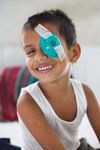Seeing is Believing: A visionary partnership - Standard Chartered
←
→
Page content transcription
If your browser does not render page correctly, please read the page content below
Seeing is Believing:
A visionary partnership
Standard Chartered has the permission to reproduce the photos in this report and includes additional photo credits where required.3 17 years of Seeing is Believing Seeing is Believing 4
Seeing is Believing Between 2003 and 2020, Standard Chartered raised
Vision loss affects more than 1.35 billion
globally. It can prevent people from attending
school or maintaining a job, limiting their ability
to support themselves and their families.
USD 104.2 million
enabling Seeing is Believing (SiB) to reach
Yet more than 75 per cent of all visual
impairment can be prevented or cured.
250 million people across
38 countries
Standard Chartered set out to address
this problem through Seeing is Believing,
an ambitious partnership with the International
Agency for the Prevention of Blindness (IAPB)
to tackle avoidable blindness and visual SiB has supported
impairment.
5.1 million
sight-restoring
surgeries and trained more than
374,000 health workersThe issue 6
The issue
Avoidable blindness and visual impairment
are key health issues across our footprint,
impacting access to education and employment
opportunities with long-term implications for
livelihoods and economic growth.
Globally, an estimated
1.35 billion people
have significant levels of vision loss: 36 million are blind; 217 million have very serious
problems seeing distance objects; and 1.1 billion have problems seeing near objects.1
More than
75 per cent
of all visual impairment can be prevented or cured.1
89 per cent
of those affected live in low- and middle-income countries.1
Good vision is pivotal to educational attainment and facilitates participation in the
workforce, contributing to economic benefits and a sense of identity. Some estimates state
that every USD1 invested in eliminating avoidable blindness generates on average USD4
of economic gain in emerging economies.2
1
http://atlas.iapb.org/global-burden-vision-impairment/
2
Price Waterhouse Coopers and The Fred Hollows Foundation. (201). Investing in Vision. The cost & benefits of ending avoidable blindness. Last accessed October
Image courtesy of Tommy Trenchard/Sightsavers. 2019 https://www.hollows.org/getattachment/au/What-We-Do/Ending-Avoidable-blindness/Research/PwC-Investing-in-Vision.pdf.aspx.7 17 years of Seeing is Believing
Our approach
Between 2003 and 2020, SiB has funded
projects implemented by international eye
health organisations providing access to
affordable and quality eye health services to
people in low- and middle-income countries.
SiB began in 2003, when the Bank committed to raise enough money for 28,000 sight-
restoring surgeries – one for every member of staff at the time - to celebrate its 150th
anniversary.
SiB evolved from supporting cataract surgeries into a global multi-stakeholder partnership
that supports comprehensive eye care, strengthens eye health systems and fosters the
development of new technologies across Asia, Africa, the Middle East and South America.
In 2018, Standard Chartered celebrated 15 years of SiB and announced that with bank
matching the USD100 million fundraising target had been reached two years ahead
of schedule.
SiB has reached 250 million people through 237 projects across 38 countries low-and
middle-income countries.
This includes 44 Innovation Fund projects to develop pioneering ideas that have the
potential to significantly impact how eye care is delivered in low-and middle-income Screened over
countries.
SiB is a strong model for corporates and NGOs to deliver the Sustainable Development
Goals (SDGs).3 37,000 people
for visual impairment.
Treated Dispensed
7.4 million people
for other eye conditions (e.g. glaucoma, diabetic retinopathy, retinopathy
1.78 million
pairs of spectacles and low vision devices.
of prematurity).
3
A Visionary Partnership - https://av.sc.com/corp-en/content/docs/A-partnership-vision-15-years-of-Seeing-is-Believing.pdf9 17 years of Seeing is Believing Our impact 10
Our impact Supported
SiB changed the lives of millions of individuals 5.1 million
and families, making it easier for many to sight-restoring surgeries.
return to education and work. As a result, Trained
this has boosted local economies and
strengthened communities. 374,000
health workers.
SiB is internationally recognised and acclaimed. By virtue of the difference made by its
efforts in eye health, the Bank became the only corporate member in 2008 to sit on the
Distributed
National Council of Eye Health (NCEH).
SiB leveraged
Vitamin A
USD158 million
for eye care. 4
deficiency supplements and treatment for river
blindness (Onchocerciasis) to 13 million people.
Reached
250 million
people through medical interventions, eye examinations, eye health education
and training.
Image courtesy of Ashley Gilbertson.
4
A Visionary Partnership - https://av.sc.com/corp-en/content/docs/A-partnership-vision-15-years-of-Seeing-is-Believing.pdf Image courtesy of IAPBThe legacy of Seeing is Believing 12
The legacy of Seeing is Believing
SiB provided access to affordable and quality
eye health services to people in low- and
middle-icome countries, reaching millions
of people.
Standard Chartered will build on Seeing is
Believing’s legacy by mobilising support for the
Vision Catalyst Fund and by supporting people
with visual impairment through Futuremakers
by Standard Chartered, the Bank’s global
initiative to tackle inequality and promote
economic inclusion.
Further reading
World Health Organisation World Report on Vision:
https://www.who.int/publications-detail/world-report-on-vision
IAPB Vision Atlas:
http://atlas.iapb.org/
A Visionary Partnership:
https://av.sc.com/corp-en/content/docs/A-partnership-vision-15-years-of-Seeing-is-
Believing.pdf
Image courtesy of Patrick Barth.You can also read
























































